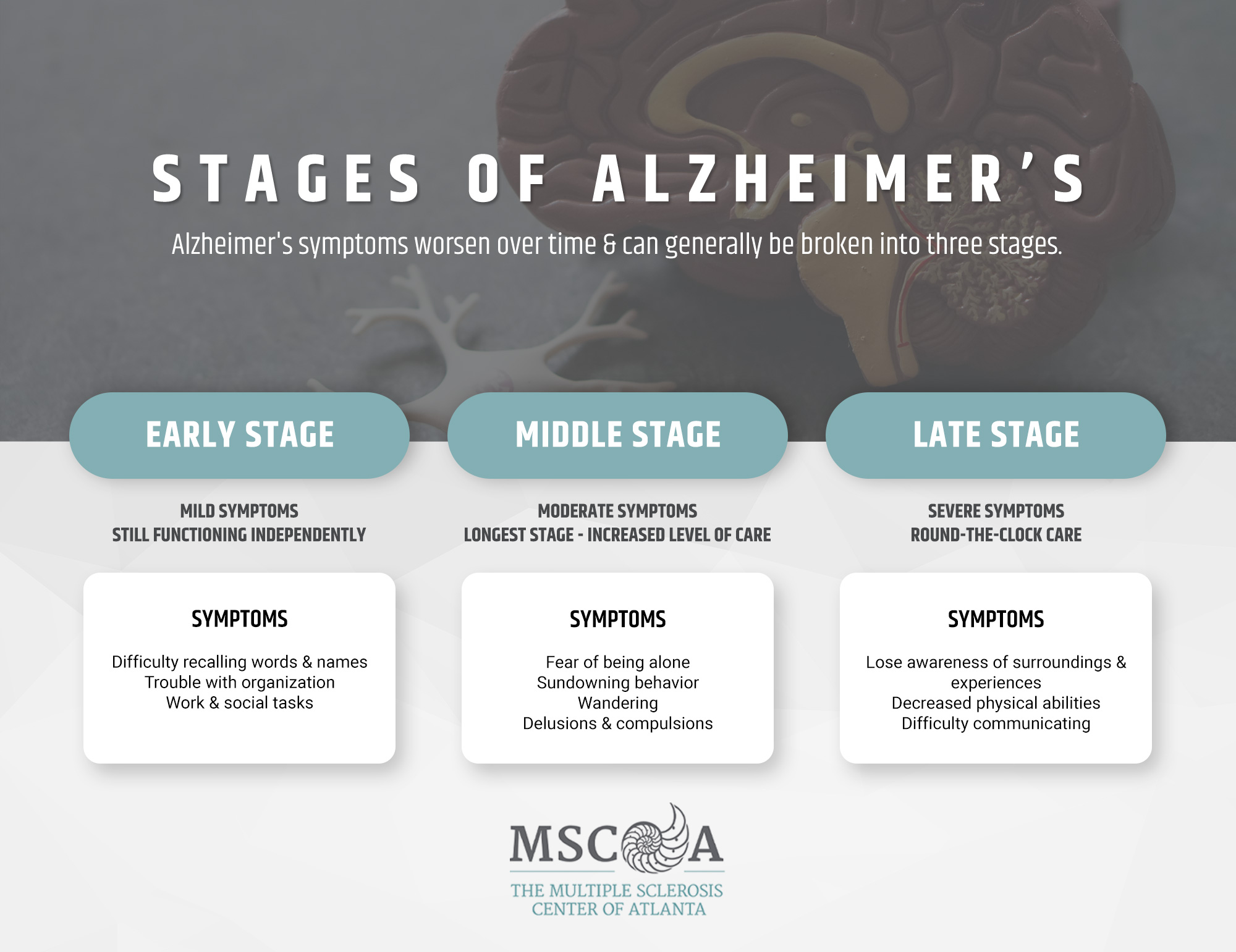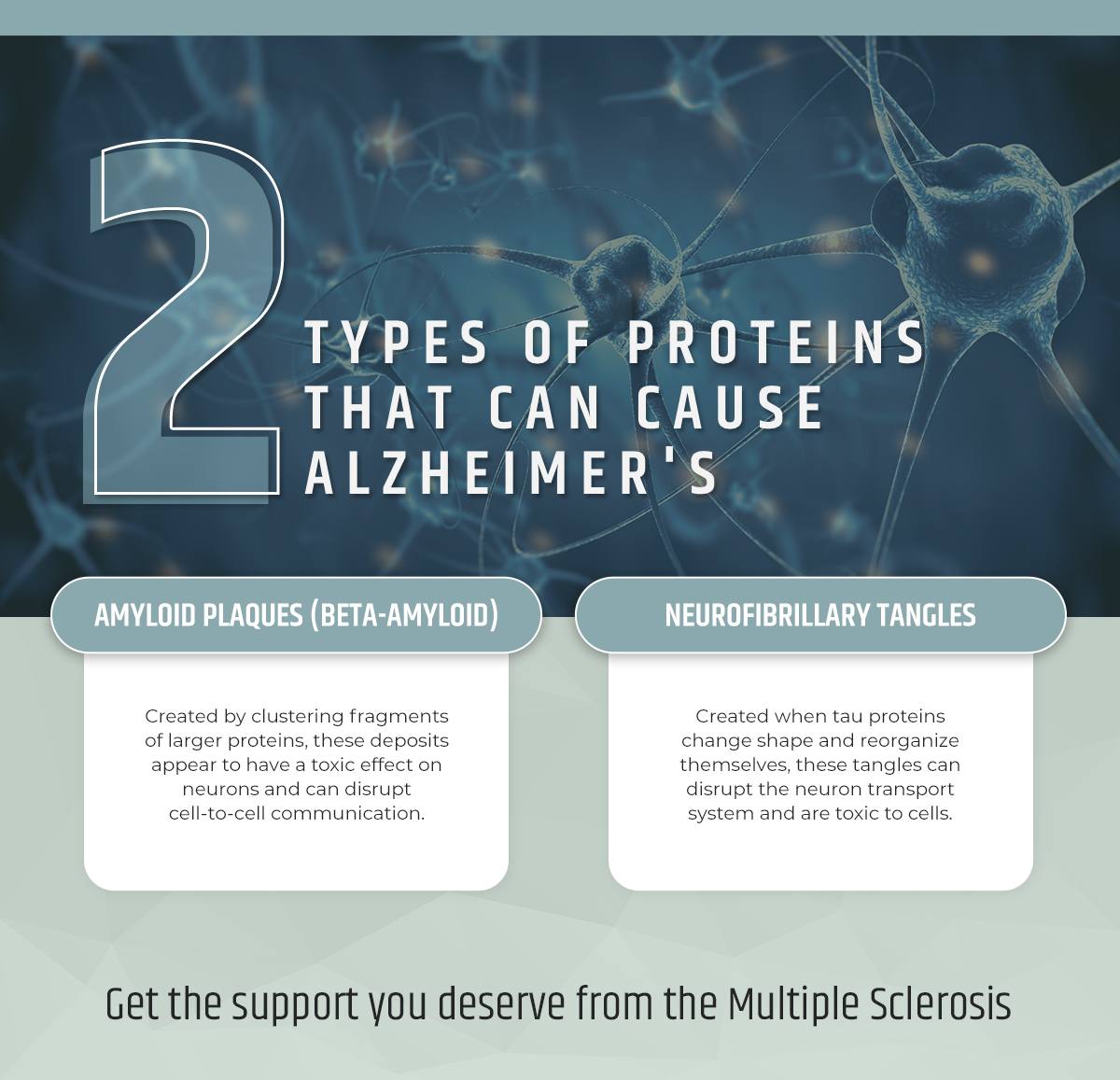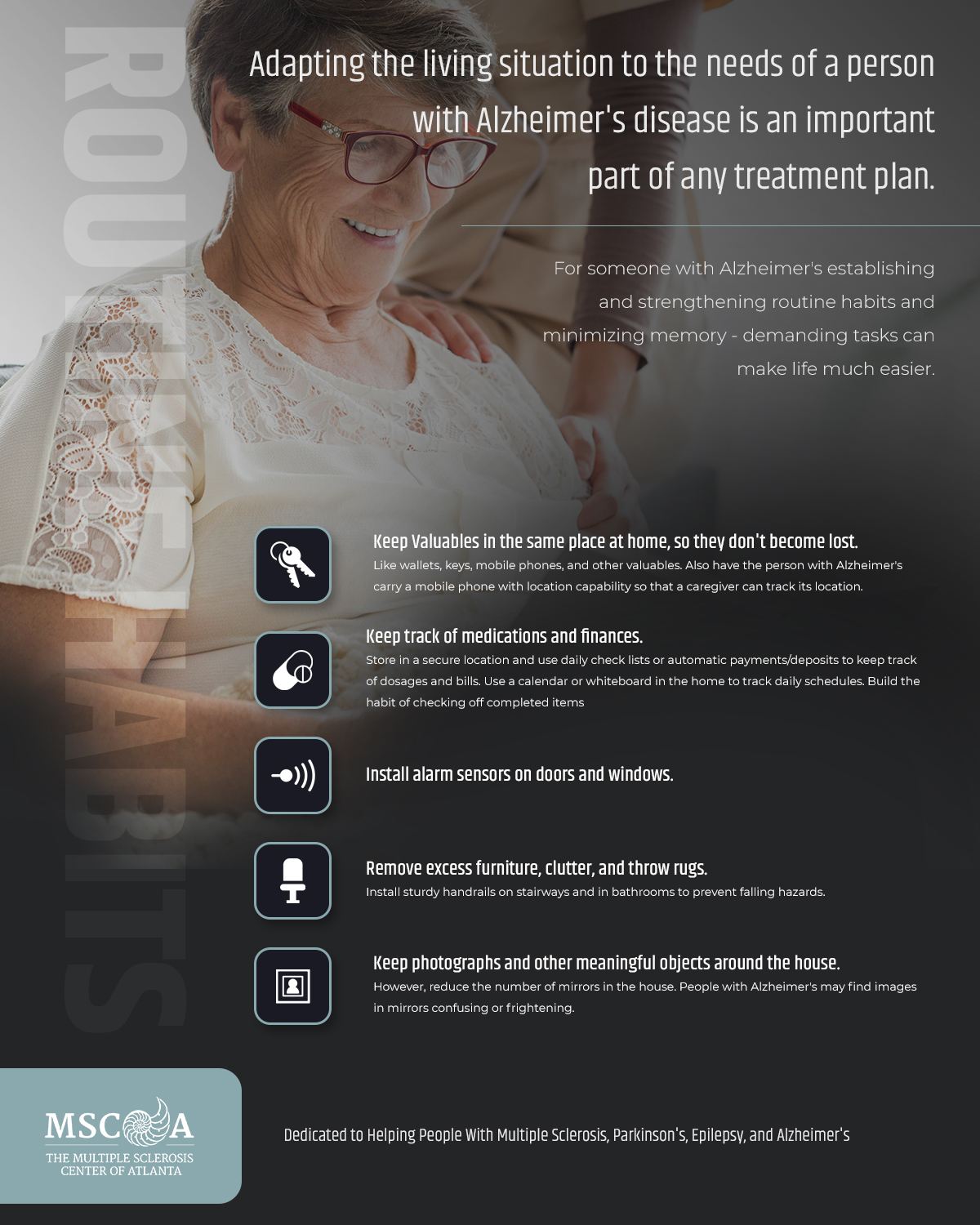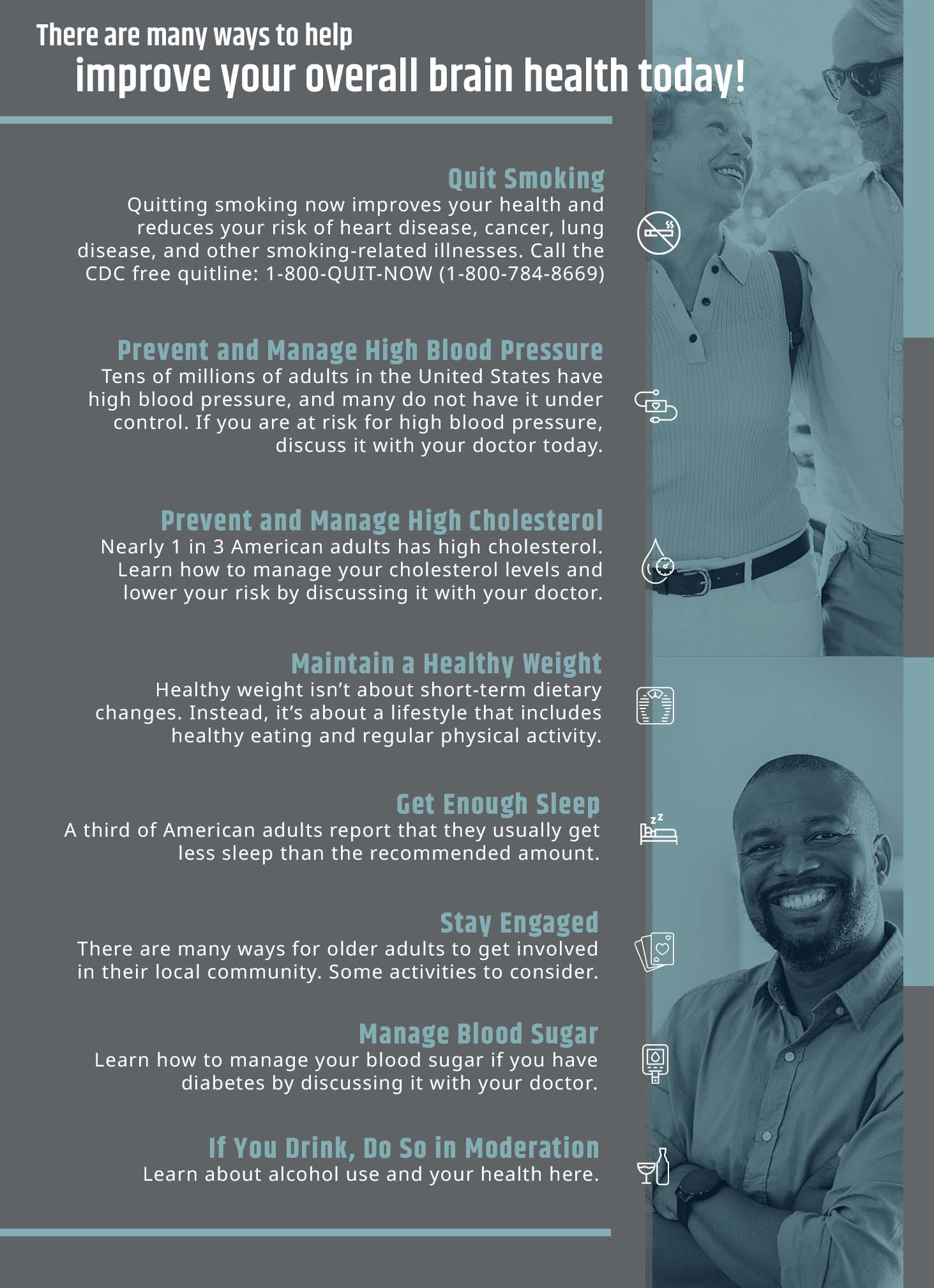What is Alzheimer’s?
Alzheimer's disease is a progressive degenerative neurologic disease that causes premature loss of brain cells leading to progressive memory loss and cognitive failure over time. It is the most common cause of the clinical condition we call dementia, and it leads to a continuous decline in thinking, behavioral and social skills that ultimately limits a person's ability to function independently. Although some memory changes are seen with normal aging, this degree of memory impairment is not part of the normal aging process.

Symptoms
In the beginning, changes in memory can be subtle and often difficult to recognize from normal aging. The patient may not appreciate these changes themselves but, over time, the need for reminders and repetition become increasingly obvious to family members and friends. The most common early symptom is difficulty remembering newly learned information or problems with short-term recall. As the disease progresses it leads to increasingly severe symptoms including:
- Disorientation, mood, and behavior changes
- Deepening confusion about events, time, and place
- Unfounded suspicions about family, friends, and professional caregivers
- More serious memory loss and behavior changes
- Difficulty speaking, swallowing, and walking
A person with Alzheimer's disease may not be able to communicate that he or she is experiencing pain, explain symptoms of another illness, follow a prescribed treatment plan, or explain medication side effects.
Stages of Alzheimer’s
The symptoms of Alzheimer's disease worsen over time, although the rate at which the disease progresses varies person to person. Changes in the brain related to Alzheimer's begin years before any signs of the disease. This time period, which can last for years, is referred to as preclinical Alzheimer's disease. The stages are separated into three categories: mild Alzheimer's disease, moderate Alzheimer's disease and severe Alzheimer's disease. It may be difficult to place a person with Alzheimer's in a specific stage as stages may overlap.

Diagnosing Alzheimer’s
There is no single diagnostic test that can determine if a person has Alzheimer’s disease. Our doctors use a variety of approaches and tools to help make a diagnosis, such as:
- Medical History and Genetic Testing
- Mental Cognitive Status Tests
- Physical Exams
- Neurological Exams
- Brain Imaging, most commonly MRI or CT
Researchers trying to understand the cause of Alzheimer's disease are focused on the role of two proteins, beta amyloid and neurofibrillary tangles.

Risk Factors
The greatest known risk factor is increasing age, and the majority of people with Alzheimer’s are 65 and older. If it affects a person under 65 years old it is considered to be younger-onset, or early-onset, Alzheimer’s. Other factors may include:
- Family History: Those who have a parent, brother or sister with Alzheimer’s are more likely to develop the disease. The risk increases if more than one family member has the illness.
- Genetics: Scientists know of two categories of genes that influence whether a person develops a disease: risk genes and deterministic genes. Alzheimer's genes have been found in both categories. It is estimated that less than 1% of Alzheimer’s cases are caused by deterministic genes (genes that cause a disease, rather than increase the risk of developing a disease).
- Head Injury: There is a link between head injury and future risk of dementia. Protect your brain by buckling your seat belt, wearing your helmet when participating in sports, and “fall-proofing” your home.
- Heart Health: Research has shown that the same risk factors associated with heart disease may also increase the risk of Alzheimer's disease. These include:
- Lack of exercise
- Obesity
- Smoking or exposure to secondhand smoke
- High blood pressure
- High cholesterol
- Poorly controlled type 2 diabetes
These factors can all be modified. Therefore, changing lifestyle habits can to some degree alter your risk. For example, regular exercise and a healthy low-fat diet rich in fruits and vegetables are associated with a decreased risk of developing Alzheimer's disease.
- Lifestyle: One promising line of research suggests that strategies for overall healthy aging may help keep the brain healthy and may even reduce the risk of developing Alzheimer’s and other dementias. These measures include eating a healthy diet, staying socially active, avoiding tobacco and excess alcohol, and exercising both the body and mind.
- Lifelong learning and social engagement: Studies have found an association between lifelong involvement in mentally and socially stimulating activities and a reduced risk of Alzheimer's disease. Low education levels — less than a high school education — appear to be a risk factor for Alzheimer's disease.
Research shows that older Latinos are about one-and-a-half times as likely as older whites to have Alzheimer’s and other dementias, while older African-Americans are about twice as likely to have the disease as older whites. The reason for these differences is not well understood, but researchers believe that higher rates of vascular disease in these groups may also put them at greater risk for developing Alzheimer’s.
Treating Alzheimer’s
There's no cure for Alzheimer’s, but there are treatments that may change disease progression, and drug and non-drug options that may help treat symptoms such as behavior and sleep changes. Understanding available options can help individuals living with the disease and their caregivers to cope with symptoms and improve quality of life, such as:
- Helping people maintain brain health.
- Managing behavioral symptoms.
- Slowing or delaying symptoms of the disease.
There are 3 classes of medication presently approved for the management of symptoms of Alzheimer's disease. Cholinesterase inhibitors help to increase a brain chemical called acetylcholine in vital areas of the brain related to memory retrieval. Memantine is also helpful in slowing the progression of memory decline and improving behavioral changes in patients with moderate to severe disease. Most recently, aducanumab was approved as the first treatment to try to eliminate the toxic buildup of amyloid plaques within the brain. It is anticipated that there will be additional medications of this type which will be submitted for approval in the near future. Not all of these medications are appropriate for everyone with Alzheimer's disease, but your physician will be able to determine whether these may help depending on your situation.
Creating a Safe and Supportive Environment
Adapting the living situation to the needs of a person with Alzheimer's disease is an important part of any treatment plan. For someone with Alzheimer's, establishing and strengthening routine habits and minimizing memory-demanding tasks can make life much easier.
You can take these steps to support a person's sense of well-being and continued ability to function:
- Always keep keys, wallets, mobile phones and other valuables in the same place at home, so they don't become lost.
- Keep medications in a secure location. Use a daily checklist to keep track of dosages.
- Arrange for finances to be on automatic payment and automatic deposit.
- Have the person with Alzheimer's carry a mobile phone with location capability so that a caregiver can track its location. Program important phone numbers into the phone.
- Install alarm sensors on doors and windows.
- Make sure regular appointments are on the same day at the same time as much as possible.
- Use a calendar or whiteboard in the home to track daily schedules. Build the habit of checking off completed items.
- Remove excess furniture, clutter and throw rugs.
- Install sturdy handrails on stairways and in bathrooms.
- Ensure that shoes and slippers are comfortable and provide good traction.
- Reduce the number of mirrors. People with Alzheimer's may find images in mirrors confusing or frightening.
- Make sure that the person with Alzheimer's carries identification or wears a medical alert bracelet.
- Keep photographs and other meaningful objects around the house.
Living with Alzheimer’s
Alzheimer's disease is not a preventable condition. However, several lifestyle risk factors for Alzheimer's can be modified. Evidence suggests that changes in diet, exercise, and habits — steps to reduce the risk of cardiovascular disease — may also lower your risk of developing Alzheimer's disease and other disorders that cause dementia.
During the early stage, it’s possible for people with dementia to live well by taking control of their health and wellness and focusing their energy on aspects of their life that are most meaningful to them. Some ways to live well with Alzheimer’s include:

Get educated! We encourage you to explore and learn what resources are available to you to support you and your loved ones through your diagnosis.

FAQs
Resources for Patients and Caregivers
Check out our list of resources that we recommend to our patients and caregivers.
Caring for the Caregiver
Caring for a person with Alzheimer's disease is physically and emotionally demanding. Feelings of anger and guilt, stress and discouragement, worry and grief, and social isolation are common.
Caregiving can even take a toll on the caregiver's physical health. Paying attention to your own needs and well-being is one of the most important things you can do for yourself and for the person with Alzheimer's.
If you're a caregiver for someone with Alzheimer's, you can help yourself by:
- Learning as much about the disease as you can
- Asking questions of doctors, social workers and others involved in the care of your loved one
- Calling on friends or other family members for help when you need it
- Taking a break every day
- Spending time with your friends
- Taking care of your health by seeing your own doctors on schedule, eating healthy meals and getting exercise
- Joining a support group
- Making use of a local adult day center, if possible
Many people with Alzheimer's and their families benefit from counseling or local support services. Contact your local Alzheimer's Association affiliate to connect with support groups, doctors, occupational therapists, resources and referrals, home care agencies, residential care facilities, a telephone help line, and educational seminars.
